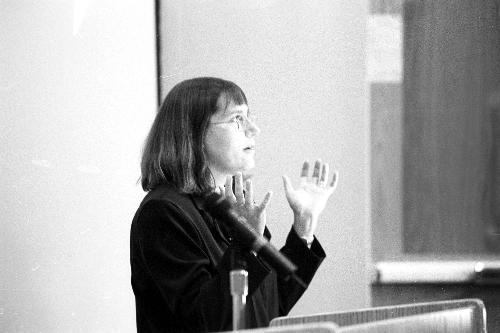
News
Pro-Palestine Encampment Represents First Major Test for Harvard President Alan Garber

News
Israeli PM Benjamin Netanyahu Condemns Antisemitism at U.S. Colleges Amid Encampment at Harvard

News
‘A Joke’: Nikole Hannah-Jones Says Harvard Should Spend More on Legacy of Slavery Initiative

News
Massachusetts ACLU Demands Harvard Reinstate PSC in Letter

News
LIVE UPDATES: Pro-Palestine Protesters Begin Encampment in Harvard Yard
Philosopher Attacks Self-Interest

A University of Michigan professor attempted to resolve a classic philosophical quandary and unlock the secrets of social harmony in a speech delivered yesterday at the Starr Auditorium at the Kennedy School of Government.
Before an attentive audience of about 100, Elizabeth S. Anderson, professor of philosophy and women’s studies, tackled the famous prisoner’s dilemma, a theoretical situation that challenges the legitimacy of self-interest.
In the traditional version of the prisoner’s dilemma, two accused prisoners are offered a chance to confess.
If one confesses and the other does not, the confessor will be released immediately and the co-conspirator will spend 20 years in prison.
If both confess, they each face a sentence of 15 years. If, on the other hand, neither talks, both will be freed in just a few months.
Self-interest dictates that each should confess. But if both act on their self-interest, the prisoners’ fate is worse than if they had acted with each other’s interest in mind.
Anderson said the prisoner’s dilemma identifies a shortcoming of self-interest theory.
She said the theory fails to explain important social phenomena, such as widespread human cooperation.
She offered her own solution.
“Identities, not interests, explain and justify behavior,” Anderson said.
According to Anderson, if the prisoners rationally identify with each other “as a plural subject,” both will know not to confess.
But if they identify themselves as separate individuals, rationality dictates that both talk.
Anderson extended this concept of social identity to society as a whole, exploring reasons to identify with others. She downplayed the importance of inescapable identities such as race and gender. She emphasized instead identities that people can forge for themselves.
“The key to solving many social problems is to establish more global social identities,” she said.
After her speech, when she took questions from those in attendance, some in the audience voiced concerns that identities are not manipulated as easily as Anderson seemed to suggest.
First-year philosophy graduate student Michael Kessler said that he agreed with Anderson’s basic claims but that self-interest and identity theories are not mutually exclusive.
“Once you know your identity, you know what your self-interest is,” Kessler said.
“Self-interest becomes a function of identity,” he said.
Want to keep up with breaking news? Subscribe to our email newsletter.
